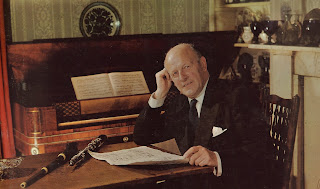 |
| The Stuyvesant String Quartet as pictured for their recording of the Shostakovich Quartet, Op. 49 |
This is the second of two posts dealing with the Stuyvesant String Quartet, and presents them in two works by Shostakovich, one of them recorded only a week after the American première of the work by the same artists. This was the Piano Quintet, Op. 57, which Shostakovich had written the year before, and played the first performance with the Beethoven Quartet in November, 1940. Here the pianist is Vivian Rivkin, the wife of conductor Dean Dixon:
Shostakovich: Quintet for Piano and Strings, Op. 57
Vivian Rivkin, piano, with the Stuyvesant String Quartet
Recorded May 7 and 8, 1941
Columbia Masterworks set MM-483, four 78-rpm records
Link (FLAC files, 72.85 MB)
Link (MP3 files, 33.42 MB)
As I mentioned in the previous post, the Stuyvesant Quartet, founded in 1938 by the Shulman brothers, Sylvan (first violinist) and Alan (cellist), had varying inner voices during its first five or six years of existence. On the Shostakovich Quintet, these are Harry Glickman (second violin) and Louis Kievman (viola). For the next recording, made the day before the Petrillo recording ban took effect, these had changed to Maurice Wilk (second violin) and Emanuel Vardi (viola):
Shostakovich: Quartet No. 1, Op. 49
The Stuyvesant String Quartet
Recorded July 30, 1942
Columbia Masterworks set MX-231, two 78-rpm records
Link (FLAC files, 33.45 MB)
Link (MP3 files, 17.13 MB)
At the time of this recording, Shostakovich had written only one string quartet. This wasn't the first recording of it, but the previous one, by the York Quartet, was already out of print by the time the Stuyvesant's appeared, having been issued on the fly-by-night Royale label.
Before founding the Stuyvesant Quartet, Sylvan and Alan Shulman played in the Kreiner Quartet, founded in 1935 by the violist, Edward Kriener. This group, with Josef Gingold as its second violinist, made a handful of recordings, including this first recording of Malipiero's "Rispetti e Strambotti", a work that would later become a specialty of the Stuyvesant String Quartet:
Malipiero: Rispetti e Strambotti (String Quartet No. 1)
and
Beryl Rubinstein: Passepied
The Kreiner Quartet
Recorded June 7, July 19 and August 14, 1937
Victor Musical Masterpiece set DM-397, three 78-rpm records
Link (FLAC files, 63.65 MB)
Link (MP3 files, 38.26 MB)
These uploads complete the "reissue" program I have been working on for the last two or three months; I originally offered these recordings in 2008.







